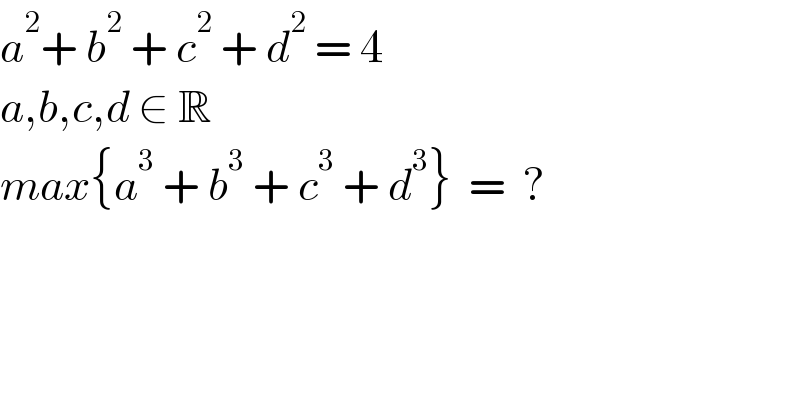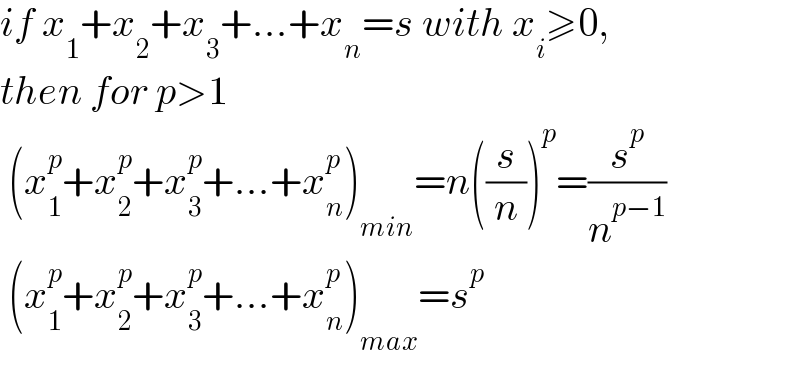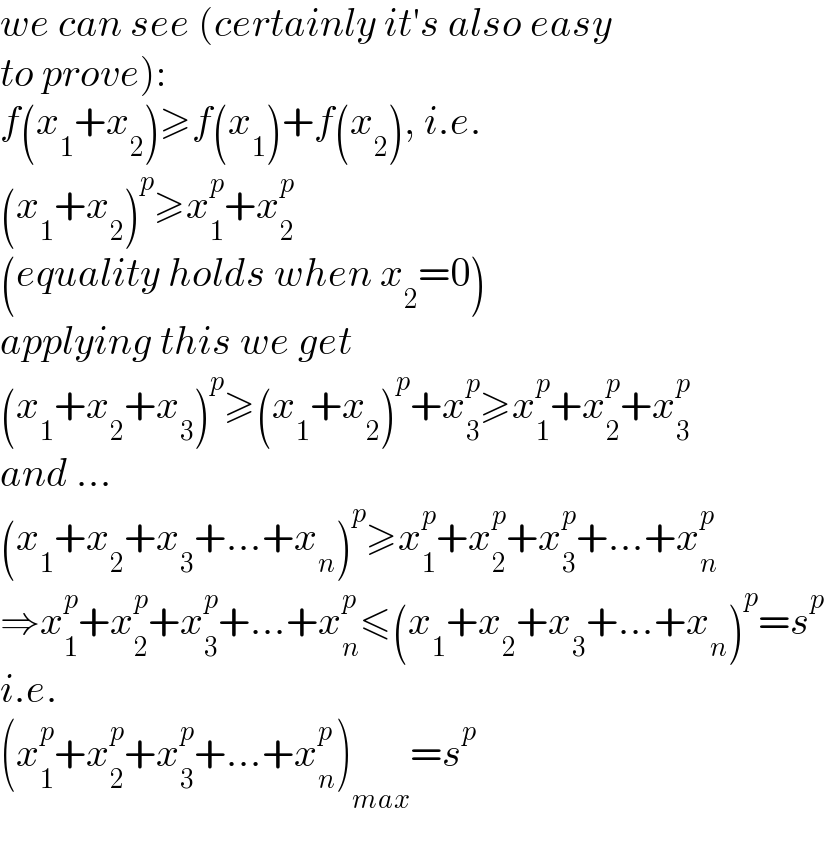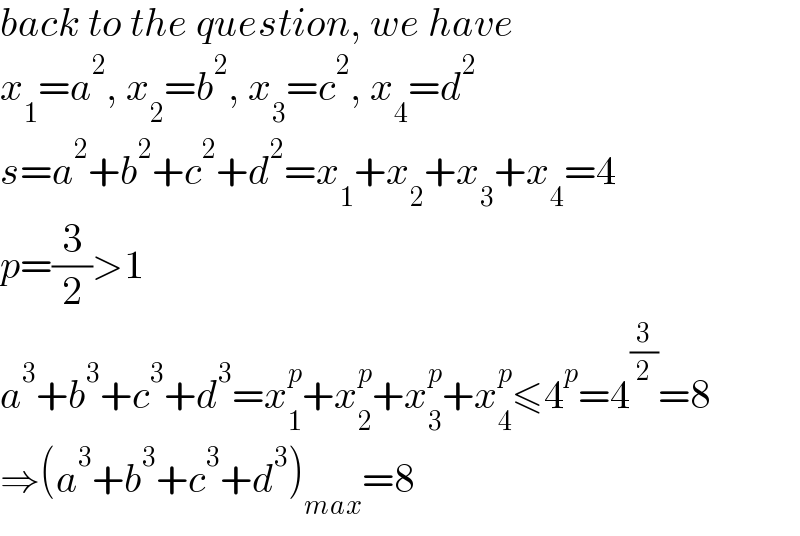
Question Number 157749 by naka3546 last updated on 27/Oct/21

$${a}^{\mathrm{2}} +\:{b}^{\mathrm{2}} \:+\:{c}^{\mathrm{2}} \:+\:{d}^{\mathrm{2}} \:=\:\mathrm{4} \\ $$$${a},{b},{c},{d}\:\in\:\mathbb{R} \\ $$$${max}\left\{{a}^{\mathrm{3}} \:+\:{b}^{\mathrm{3}} \:+\:{c}^{\mathrm{3}} \:+\:{d}^{\mathrm{3}} \right\}\:\:=\:\:? \\ $$
Commented by naka3546 last updated on 28/Oct/21

$$\mathrm{W}{hich}\:\:{inequality}\:\:{is}\:\:{used}\:\:{for}\:\:{solving}\:\:{it}\:? \\ $$
Commented by mr W last updated on 27/Oct/21

$${max}=\mathrm{8} \\ $$
Commented by naka3546 last updated on 27/Oct/21

$${Show}\:\:{your}\:\:{workings},\:{please},\:{sir}. \\ $$
Commented by naka3546 last updated on 27/Oct/21

$${Thank}\:\:{you},\:{sir}. \\ $$
Commented by mr W last updated on 27/Oct/21

$${if}\:{x}_{\mathrm{1}} +{x}_{\mathrm{2}} +{x}_{\mathrm{3}} +...+{x}_{{n}} ={s}\:{with}\:{x}_{{i}} \geqslant\mathrm{0}, \\ $$$${then}\:{for}\:{p}>\mathrm{1} \\ $$$$\:\left({x}_{\mathrm{1}} ^{{p}} +{x}_{\mathrm{2}} ^{{p}} +{x}_{\mathrm{3}} ^{{p}} +...+{x}_{{n}} ^{{p}} \right)_{{min}} ={n}\left(\frac{{s}}{{n}}\right)^{{p}} =\frac{{s}^{{p}} }{{n}^{{p}−\mathrm{1}} } \\ $$$$\:\left({x}_{\mathrm{1}} ^{{p}} +{x}_{\mathrm{2}} ^{{p}} +{x}_{\mathrm{3}} ^{{p}} +...+{x}_{{n}} ^{{p}} \right)_{{max}} ={s}^{{p}} \\ $$
Commented by mr W last updated on 03/Aug/23

$${i}\:{don}'{t}\:{know}\:{if}\:{i}'{m}\:{using}\:{a}\:{known} \\ $$$${inequality}.\:{actually}\:{i}\:{just}\:{use}\:{my} \\ $$$${brain}\:{and}\:{logic}. \\ $$$${let}'{s}\:{look}\:{at}\:{f}\left({x}\right)={x}^{{p}} \:{with}\:{p}>\mathrm{1}.\: \\ $$
Commented by mr W last updated on 28/Oct/21

Commented by mr W last updated on 03/Aug/23

$${we}\:{can}\:{see}\:\left({certainly}\:{it}'{s}\:{also}\:{easy}\right. \\ $$$$\left.{to}\:{prove}\right): \\ $$$${f}\left({x}_{\mathrm{1}} +{x}_{\mathrm{2}} \right)\geqslant{f}\left({x}_{\mathrm{1}} \right)+{f}\left({x}_{\mathrm{2}} \right),\:{i}.{e}. \\ $$$$\left({x}_{\mathrm{1}} +{x}_{\mathrm{2}} \right)^{{p}} \geqslant{x}_{\mathrm{1}} ^{{p}} +{x}_{\mathrm{2}} ^{{p}} \\ $$$$\left({equality}\:{holds}\:{when}\:{x}_{\mathrm{2}} =\mathrm{0}\right) \\ $$$${applying}\:{this}\:{we}\:{get} \\ $$$$\left({x}_{\mathrm{1}} +{x}_{\mathrm{2}} +{x}_{\mathrm{3}} \right)^{{p}} \geqslant\left({x}_{\mathrm{1}} +{x}_{\mathrm{2}} \right)^{{p}} +{x}_{\mathrm{3}} ^{{p}} \geqslant{x}_{\mathrm{1}} ^{{p}} +{x}_{\mathrm{2}} ^{{p}} +{x}_{\mathrm{3}} ^{{p}} \\ $$$${and}\:... \\ $$$$\left({x}_{\mathrm{1}} +{x}_{\mathrm{2}} +{x}_{\mathrm{3}} +...+{x}_{{n}} \right)^{{p}} \geqslant{x}_{\mathrm{1}} ^{{p}} +{x}_{\mathrm{2}} ^{{p}} +{x}_{\mathrm{3}} ^{{p}} +...+{x}_{{n}} ^{{p}} \\ $$$$\Rightarrow{x}_{\mathrm{1}} ^{{p}} +{x}_{\mathrm{2}} ^{{p}} +{x}_{\mathrm{3}} ^{{p}} +...+{x}_{{n}} ^{{p}} \leqslant\left({x}_{\mathrm{1}} +{x}_{\mathrm{2}} +{x}_{\mathrm{3}} +...+{x}_{{n}} \right)^{{p}} ={s}^{{p}} \\ $$$${i}.{e}. \\ $$$$\left({x}_{\mathrm{1}} ^{{p}} +{x}_{\mathrm{2}} ^{{p}} +{x}_{\mathrm{3}} ^{{p}} +...+{x}_{{n}} ^{{p}} \right)_{{max}} ={s}^{{p}} \\ $$
Commented by mr W last updated on 28/Oct/21

$${back}\:{to}\:{the}\:{question},\:{we}\:{have} \\ $$$${x}_{\mathrm{1}} ={a}^{\mathrm{2}} ,\:{x}_{\mathrm{2}} ={b}^{\mathrm{2}} ,\:{x}_{\mathrm{3}} ={c}^{\mathrm{2}} ,\:{x}_{\mathrm{4}} ={d}^{\mathrm{2}} \\ $$$${s}={a}^{\mathrm{2}} +{b}^{\mathrm{2}} +{c}^{\mathrm{2}} +{d}^{\mathrm{2}} ={x}_{\mathrm{1}} +{x}_{\mathrm{2}} +{x}_{\mathrm{3}} +{x}_{\mathrm{4}} =\mathrm{4} \\ $$$${p}=\frac{\mathrm{3}}{\mathrm{2}}>\mathrm{1} \\ $$$${a}^{\mathrm{3}} +{b}^{\mathrm{3}} +{c}^{\mathrm{3}} +{d}^{\mathrm{3}} ={x}_{\mathrm{1}} ^{{p}} +{x}_{\mathrm{2}} ^{{p}} +{x}_{\mathrm{3}} ^{{p}} +{x}_{\mathrm{4}} ^{{p}} \leqslant\mathrm{4}^{{p}} =\mathrm{4}^{\frac{\mathrm{3}}{\mathrm{2}}} =\mathrm{8} \\ $$$$\Rightarrow\left({a}^{\mathrm{3}} +{b}^{\mathrm{3}} +{c}^{\mathrm{3}} +{d}^{\mathrm{3}} \right)_{{max}} =\mathrm{8} \\ $$
Commented by naka3546 last updated on 29/Oct/21

$${Thank}\:\:{you}\:\:{so}\:\:{much}\:,\:\:{sir}. \\ $$
